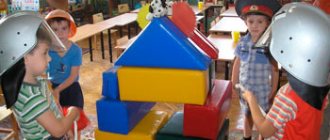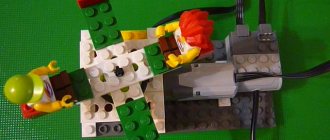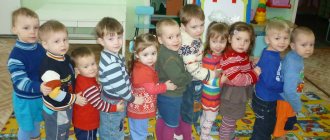Questions and answers on fire safety
Goal : to consolidate knowledge about the correct actions in the event of a fire.
Progress of the game:
Questions and answers are presented in the form of pictures (questions on one tray, answers on the other). For each situation it is necessary to choose the right answer.
Situations:
- There was a fire.
- There is a lot of smoke in the room.
- Your clothes are on fire.
- The TV started smoking.
- The old grass is burning.
- I smelled gas.
- It is difficult to breathe from the acrid smoke.
Answers:
- Call "01".
- Crawl your way to the exit.
- Get on the floor and roll.
- Turn it off, cover with a blanket.
- Cover it with soil and fill it with water.
- Open the window, call “04”.
- Breathe through the wet rag.
Fire safety game Prohibited - allowed
Objectives: consolidation of knowledge about basic fire safety requirements; increasing personal responsibility for one’s actions; formation of discipline, sense of duty.
Material:
Each child has one signal card - “traffic light”. One side of the green traffic light is “permissive”, the other side is red – “prohibiting”.
Progress of the game:
The teacher names the basic fire safety requirements in random order, and the children show the corresponding “traffic light” colors.
Methodological material for the game:
Prohibited:
- Throw burning matches and cigarette butts indoors.
- Throw away burning ash near buildings.
- Leave the doors of stoves and fireplaces open.
- Use homemade devices and fuses.
- Connect a large number of current consumers (more than three) to one outlet.
- Use faulty equipment and devices.
- Use damaged sockets.
- Wrap electric lamps and lamps with paper, cloth and other flammable materials.
- Use electric irons, stoves, kettles without stands made of fireproof materials.
- Leave electrical heating devices, radios, etc. plugged in unattended.
- Use electrical cords and drives with damaged insulation.
- Set up workshops and warehouses in apartments of residential buildings where explosive materials are used and stored.
- Leave burning stoves unattended, and also entrust small children with supervision of them.
Necessary:
- Protect yourself, property, residential building, cottage, garage, car, as well as state property from fire.
- In the event of a fire, call the fire department by phone “01”, provide the address where the fire occurred and give your last name.
- Evacuate children, sick, elderly, and disabled people from fires.
- Sound the alarm.
- Meet the firefighters and inform them about the fire.
- Post a sign in the educational institution indicating the emergency telephone number of the fire department: “01”.
- Learn to use a fire extinguisher;
- Know the evacuation plan in case of fire.
- Do not open doors in the room where the fire has occurred.
- Scream and call adults for help.
- Cover your nose and mouth with a wet bandage (handkerchief, scarf) to protect from smoke.
- Throw a piece of thick cloth moistened with water, a wet blanket, a raincoat, or a coat over yourself when you are in a fire zone.
- Move by crawling or crouching along the wall if the room is heavily smoky.
- Throw a blanket over the victim if his clothes catch fire, and press it tightly against the person’s body to stop the access of air.
- Extinguish clothes by taking them off or pressing yourself to the ground, floor, or wall.
- Open windows and doors for ventilation in smoky rooms where there is no fire.
- Remove the victim who has been taken outside from his clothes or unfasten the collar and loosen the clasp.
- Call an ambulance for the victim by calling “03” and send him to the hospital.
At what age should fire safety rules be taught?
Dangers await people everywhere. At any moment an accident, fire, animal bite, etc. can happen. An adult has a certain model of behavior in this case, but a child does not. Therefore, it is so important to give him knowledge about possible threatening situations and objects. Children receive their first lessons in the family: “you can’t touch matches,” “it’s dangerous to approach the stove.” In the garden they deepen this knowledge.
It is recommended that children be introduced to fire safety rules from the age of 3 years. First, a series of introductory lessons are conducted to help you learn what is dangerous and what is not. Children learn to recognize fire hazards and handle them correctly. Later, starting from 4–5 years old, they learn to understand the interconnection of events: “a lit match can lead to a fire in the house, an unextinguished fire can burn a forest.”




